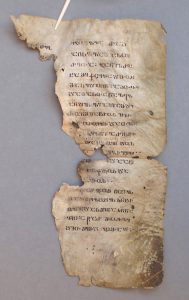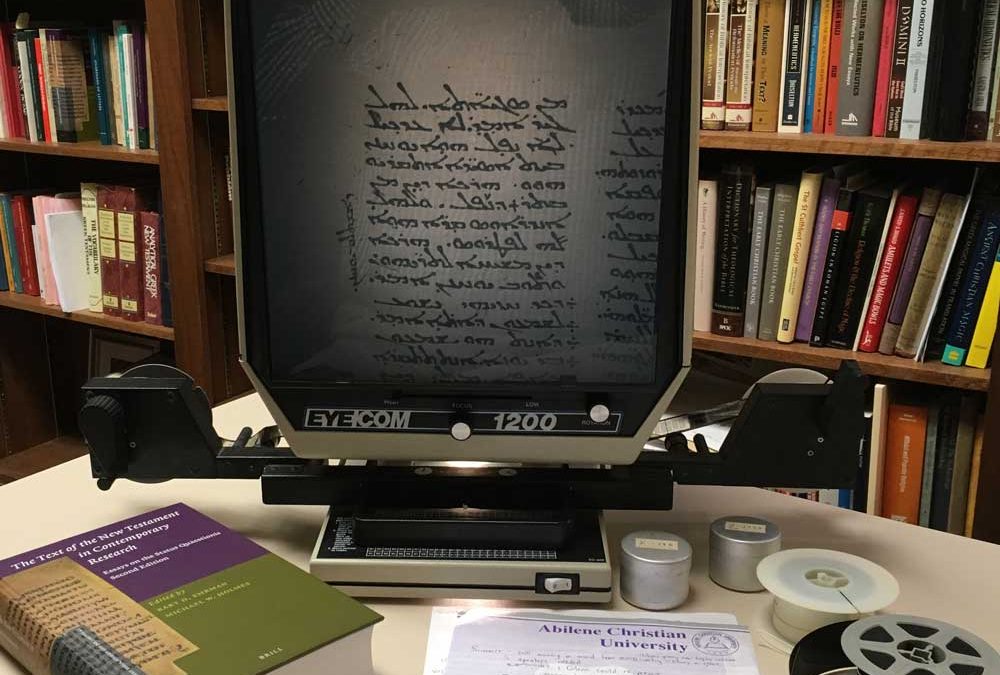In the year 2000, I was introduced to the discipline of New Testament textual criticism. As a graduate student who had just begun learning Greek but who had enjoyed a long personal history with the Bible, I was thrilled at the opportunity to study not just the Scriptures but also the manuscripts that lay behind it. I dutifully learned the skills needed, which in those days concerned matters like Greek, paleography, and how to operate a microfilm machine.
Indeed, one of the amazing things to me at that time was the availability of manuscripts on microfilm! I had read stories in books, and heard them firsthand from my mentor, of scholars working patiently and diligently in monasteries, copying texts by hand while wearing gloves, often under the watchful eye of a librarian monk or his assistant. But now, with microfilm, I could read and study biblical manuscripts from all over the world — places like Dublin, Paris, and even far-flung Mount Athos! — without even leaving my office. It seemed and was an amazing gift.
And yet, even at that time, there were rumors of things getting even better. It was the early years of what people were calling “broadband” Internet, and folks were talking about the “digitization” of manuscripts — in other words, taking images of those manuscripts and turning them into digital files that would be of higher quality, could be easily shared, and would no longer involve bulky microfilm machines. I could not imagine the work that project would take, but I could see the potential.
And here we are, barely 15 years later, and that work has yielded enormous results. Modern scholars are enjoying exactly the fruits promised — easier access to manuscripts, better quality images, and media protected from the liabilities of physical microfilm reels — not to mention an explosion of manuscripts that are even available to study at all! What’s more, there are many examples of this kind of work that are geared toward the interested public and not just specialists. Here are just a handful:
- The Codex Sinaiticus website, focused on a single yet unbelievably influential manuscript of the Bible that dates from the fourth century CE
- The digitization project at the Vatican Library in Rome, which seeks to provide digital access to about 80,000 manuscripts held in that physical library
- The Leon Levy Dead Sea Scrolls Digital Library, a specifically digital resource produced by the Israel Antiquities Authority and focused on the invaluable and perpetually interesting Dead Sea Scrolls

Acts of the Apostles (Georgian Sinai NF 9, 16r)
Given just these three resources, you will not be surprised to learn that scholars and specialists have access to an enormous range of other options as well, especially as individual libraries and centers make more and more material available. Further, there are websites that collect links to online resources, which are useful for all interested parties and can be accessed with simple internet searches. And finally, we have many useful resources that you can link to; simply click on or hover over the “Resources” link in the upper-right-hand corner of this page.
We modern individuals enjoy an amazing access to ancient materials useful for Bible study, and that access surpasses anything we have ever seen in the history of the church. May it be for us a blessing!


Fantastic!
Back in the late 80s when I was Carroll D. Osburn’s most mediocrest student, I asked him why one would not simply use a computer to compare those three manuscripts… I have since had cataracts removed which resulted from the glare I saw.
Time passes…
biblicalhumanities.org Dashboard
http://biblicalhumanities.org/dashboard/
Evangelical Textual Criticism
http://evangelicaltextualcriticism.blogspot.com/
Center for New Testament Restoration
https://greekcntr.org
The Phoenix Seminary Text & Canon Institute
http://www.ps.edu/academics/institute/
Introduction to Text Analysis from Close Reading to Machine Learning https://courses.ceu.edu/courses/introduction-text-analysis-close-reading-machine-learning
Machine Learning and the Classics: Educated Hunches on the Role of Artificial Intelligence
https://clare.ucalgary.ca/event/2017-11-08/machine-learning-and-classics-educated-hunches-role-artificial-intelligence
Artificial Intelligence Sheds New Light on the Origins of the Bible https://www.reddit.com/r/AcademicBiblical/comments/4ecfjm/artificial_intelligence_sheds_new_light_on_the/
Indeed! The internet has become a fabulous resource for doing research.
And we aren’t the first text-workers to have their eyesight affected! I’m reminded of some of those sad-copyist comments in the margins of the manuscripts…
Great post! Really interesting and well-written — I highly recommend checking out a similar resource on this topic:
Truss Calculator
Great insights! I recently came across a useful resource that breaks down common QuickBooks errors with easy fixes. If anyone’s struggling with technical issues, this list of QuickBooks Desktop Error Code and Solutions provides detailed explanations and step-by-step resolutions. It really helped me troubleshoot my setup quickly.